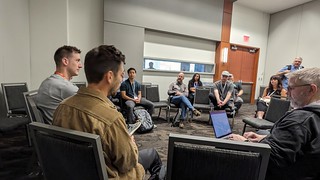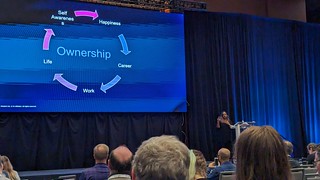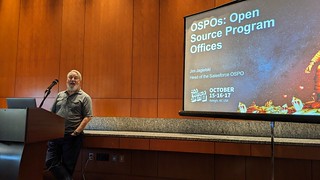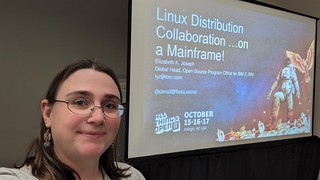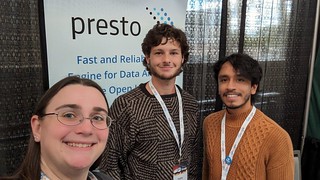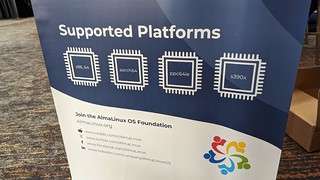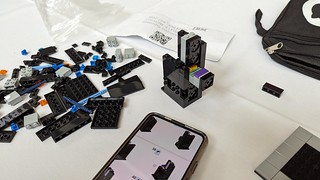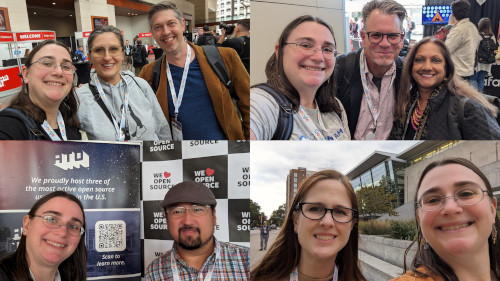The last time I was in Raleigh for All Things Open was 2018 when I was pregnant with my first child. I now have a new-since-then job, two little boys, and we’ve survived a global pandemic – what a lot of changes for me!
This was the first large open source conference I’d been to in-person since 2020, so I had a wonderful time seeing familiar faces and catching up on several years of lost time. It was also a delight to meet so many new people. From the Community Leadership Summit, to curious college students at my mainframe talk, and volunteering at the Presto booth, I had many opportunities to interact with all sorts of folks who are new to the tech industry in general, and new to open source. It also made me feel a little old as I realized that I’ve been involved with open source communities for over two decades. Though I think parenthood and those new grey hairs peaking out at my temples are aiding with that too.
The conference kicked off on Sunday with a couple community events, and I attended the Community Leadership Summit. I’ve been to a few CLS events over the years, but it looks like the last one I was at was a CLSx event in 2017, co-located with Linux Conf AU. This event is un-conference-style with an introductory keynote about community topics, followed by development of the schedule for the day. My role in open source communities has shifted a lot since my last CLS, so it was interesting going to it this time with a very different “home” community. In some ways, the topics were less applicable to me, but some of them stood out. The first session I participated in discussed getting the next generation of contributors involved with communities, and that’s one my team at work spends a tremendous amount of time on, plus my own direct mentoring each summer. It was particularly nice having some folks who are the next generation in the room, so we didn’t fall into the trap of cliches and trying to figure out what they want instead of just asking them. Ultimately, it didn’t seem like the needs have changed significantly (don’t rush to set up that TikTok account), though there is a more mobile-first inclination and they are wisely more inclined to contribute to projects that make it clear and simple to get started.
The next session I went to was around social media use by communities in the post-Twitter era. This is a tough one for me. I made a real social media home on Twitter and the downfall as been a painful one. I’ve made a new home on Mastodon in the year since the change of ownership, but professionally the executives and companies I engage with are still on Twitter, and things like my local transit agency and parks are too, along with several funny/parody accounts that I follow. The first thing I realized from the discussion during this session was that it’s unlikely that this experience will be replicated anywhere. The “town square” that was Twitter seems to have an unusual cultural phenomenon, and with everyone scattering to different networks or groups quitting social media entirely, I ultimately don’t believe we’ll find everything we had there concentrated on another platform. Instead, we need to adapt and find new communities and networks, and change how we engage. It’s a sad realization, but one that set me free somewhat. I need to stop mourning what was lost and move on with full investment in new places. The session also caused me to stop putting effort into Bluesky. I haven’t found value in that network so far, and it’s just another for-profit company that I’m pouring my time into, why exactly? I figure if it takes off, I can always hop back on. For now, I’m being more thoughtful about precisely what I’m posting on Twitter versus Mastodon, with a focus on most of my work stuff going to Twitter with the exception of the very technical or “geeky” stuff, which goes to Mastodon, and I’ve scaled back the personal stuff I put on Twitter in favor of Mastodon, though I still do some. As for communities, I wish more open source communities made the leap to Mastodon, but what I’ve instead found is a lot of projects have simply given up on social media. When the APIs on Twitter died, they packed up and never came back anywhere. As a participant in a project that was reluctantly dragged into social media and once on it, automated everything, I understand that. Still, it was a fun way to engage that I’ll miss.
The last two sessions I went to at CLS were also interesting. The first was around how to use community metrics, and the dangers of using those metrics as a goal, rather than using them to make decisions about engagement efforts and strategies. There’s a fine line here that we stumbled over several times in the discussions, but I think a big chunk of it came from a disconnect between how Marketing and similar departments view engagement and how communities do. Ultimately it does seem like there are some metrics that can be used as goals, but not all of them, and they can’t be focused upon without further inspection and context with regard to the community. The final session had me join a former colleague from the OpenStack Infrastructure team as we discussed security in open source software. He provided an excellent tour of available resources and kept the floor open for questions and engagement, which I was grateful for because I had some very honest questions to ask that I trusted him to answer honestly (“How legit is $this_resource/group anyway? Should I spend time with them?”). It gave me some food for thought as I came back to the office the following week and had some discussions with my security-minded open source colleagues.
The evening wrapped up with an outdoor social at the conference venue, where I got to meet up with a few folks and then head back to my room early so I’d be well-rested for the first main conference day on Monday.
Monday began with a welcome from one of the most welcoming and kind people I know in open source, Todd Lewis, and then went into a keynote from the legendary Nithya Ruff. I loved Nithya’s keynote. She began by talking about happiness and how important it is for you to cultivate and grasp that for yourself. This was a segue into her main point about how your career is similar, but for me it resonated so strongly because the happiness question is one that has a hold on me right now. She’s absolutely right, whether it’s happiness or your career, you’re in charge of your own destiny.
I spent most of my post-keynote morning in the “hallway track” catching up with folks and then just before lunch I went to Jim Jagielski’s Open Source Program Offices (OSPOs). Since I am now the global head of a federated component of IBM’s main OSPO (as of this year, I run the new OSPO for IBM Z) I wanted to see if there was anything missing in my strategy, meet with some like-minded folks, and ask Jim if there were other organizations working with a federated OSPO model like IBM is. It was a good presentation and after speaking with Jim I definitely had a nice confidence boost about our strategy, but it doesn’t seem like anyone else is doing it this way. I guess IBM is a bit exceptional in some ways due to how big the company is and how specialized the technologies are in our various departments. I work with IBM Power a lot since we’re quite aligned, and IBM Quantum every time I can find an excuse to, so we do work closely, but we do have somewhat different goals and mandates given how our technologies are used, and domain knowledge is required. The talk also inspired me to finally sign up for TODO Group communication channels, which is a great thing.
On Monday afternoon I gave my talk on Linux Distribution Collaboration …on a Mainframe! which had an… interesting start. I was chatting with couple of folks who were familiar with older mainframe technology, and someone walked in and, in front of everyone in the room asked, “Is this a funny talk or an educational one?” when I responded “educational” they walked out. It was rather jarring, but thankfully everyone in the room was incredulous as I was at the question, so it turned out to be a little bonding moment. Still, yikes. I understand not wanting to waste your time by attending a you’d rather not be in, but there are more kind and tactful ways of determining that. Thankfully, the talk itself went well (slides here), the audience was engaging and asked great questions, and it was fun to chat with folks after the talk, and even after the conference!
The next talk I went to was in a similar vein to mine, exploring the landscape of and porting open source projects to another hardware architecture. In this case it was a talk from my old friend Michael Hall who now works for Arm. They have an Arm developer program that I’ll have to take a look at, especially since they have lots of tiny devices that are fascinating and I want to buy a whole box full, haha! Since the Raspberry Pi is Arm, I actually have a couple in-use, one sits on my desk.
That evening we congregated at the nearby Crank Arm Brewing before I returned to the hotel for the Speaker & Sponsor dinner. These sorts of social events are always where my social awkwardness is showcased, but at dinner I sat with some kind people. Hopefully I didn’t talk too much about typewriters and trains.
Tuesday morning I sadly missed the keynotes because I had to head over to the IBM office for a couple hours to meet with some folks and do a recording, but by mid-day I was back at the conference to staff the Presto booth with some of my fellow IBMers.
While doing booth things, I also had the pleasure of meeting the founder of AlmaLinux, who I’d actually been sitting with at the speaker dinner the night before, and spoke with, but hilariously we didn’t talk much about work, hah! It was particularly fun to see that they listed their supported platforms (architectures) on their banner, hooray for s390x on there! I knew it would be, since they’re part of our Linux Distributions Working Group, but it was still nice to see there in person, printed out for the world to see.
From there I went to one final session, and then settled in at a table where I met some new people while assembling my IBM z16 LEGO set. I brought the LEGO set on a bit of a whim, but it turned out to be quite the conversation starter! Which is good, because I am not.
The event concluded with a lovely closing keynote from Todd, but I was a bit peopled out at this point and decided to skip the final social at a bar and arcade in favor of a quiet dinner with an old friend and an early evening back to my room.
In all, it was an amazing event. I did hallway track more than sessions, which is unusual for me, but there were so many people I wanted to meet or catch up with, that I found my time was better spent with people this time around.
I will spend some time on the All Things Open YouTube account once the sessions that were recorded are uploaded. Many thanks to all the organizers and volunteers who make this exceptional event happen every year, I was so glad to be back!


